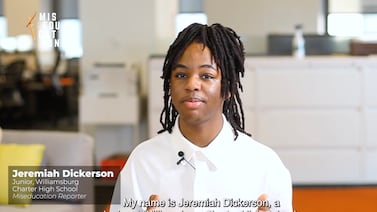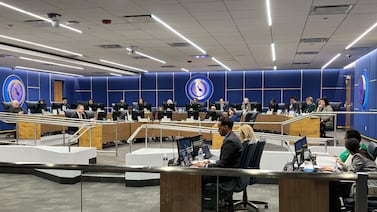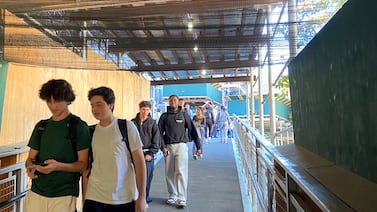Talena Lachelle Queen focuses on creating an atmosphere of love in her English writing class at Eastside High School Academy of Culinary Arts, Hospitality and Tourism in Paterson.
The teacher and poet says love looks like understanding, kindness, and support in the classroom, especially as her students returned to full-day, in-person instruction this academic year.
By establishing a welcoming environment, students feel comfortable “to confide in me and want to get higher grades because they know they are valuable,” said Queen, a Paterson native who attended a local performing arts high school.
“I got to see dancers have recitals, actors have plays, musicians have shows, and artists have exhibits,” Queen said. “The writers did not have that kind of public showcase of their talent like the other disciplines.”
So when in 2018 she was named the city’s first poet laureate by Mayor Andre Sayegh, she started the first annual Paterson Poetry Festival. The festival is intended to serve and support young emerging poets, she said.
Poetry vibrates throughout Paterson, the hometown of poet Allen Ginsberg and the setting of Williams Carlos Williams’ epic poem named after the city. The city was even at the center of the 2016 movie with its namesake, which followed the life of a fictional bus driver and poet named Paterson.
While the city is brimming with arts and culture, incidents of gun violence and homicides are also a reality. There was a record number of homicides in the city last year and the year before.
The educator didn’t have a straight path to teaching. She started out working in broadcast journalism until she took on her first teaching role in 1998 to run a grant-funded videography class at Passaic County Community College. After that, she ran a preschool and daycare in Seattle, earned her teaching certificate, returned to her hometown, and began teaching at Paterson Public Schools in 2016.
Queen shared with Chalkbeat how she helps her students heal from the last two years, why she loves teaching “science of writing,” and the advice she follows to this day.
This interview has been lightly edited for length and clarity.
Was there a moment when you decided to become a teacher?
I decided I wanted to be a teacher in kindergarten, but I forgot about that dream while pursuing a career as a writer and journalist. I got back to my dream in time.
How do you bring your poetry background into your classroom?
I bring my poetry background into the whole district. Our superintendent has been supportive in a variety of ways. I host a poetry contest open to grades 3-12. The district is the primary contest source, though it’s open to all students. I host workshops for free. I visit campsites and afterschool programs. It is true that my favorite way is right in my own classroom. I tell the scholars to “make clay.” When they make clay, I can help them to mold their creations. A great thing happens: a scholar will “trust their pen and just write,” they’ll use a style that they think they’ve invented because they haven’t had intentional exposure to poetry, then I show them published poems in the style of their natural inclinations. I tell them the name of what they’ve made. It is incredibly empowering.
Sometimes what happens is the scholar is writing on a topic that makes me think of a published poet who writes on the same topic. I introduce them to the poet’s writing and, whenever possible, the poet.
We also write poetic responses to texts that are assigned, and we find ways to infuse poetry into the lessons. It helps that I teach language arts.
Following years of disrupted learning, is there anything you’re doing differently this school year to help students catch up and heal?
I am teaching with love. Love first, then school. Love looks like understanding, kind words, praise for even the smallest things. Addressing scholars as scholars and adding “Sir” and “Ma’am” to that address. Love creates sincere feelings of safety. It prompts scholars to confide in me and want to get higher grades because they know they are valuable. Healing, I think, starts with love.
What’s your favorite lesson to teach and why?
The science of writing — that is my favorite lesson to teach. I made up the title. Basically, I’m teaching the scholars that they ought to memorize, I mean really know, the parts of an essay, the parts of a paragraph, and what kind of paragraph goes where. If we can get that part, the science of it, out of the way, then we can have space to write our ideas without angst. I want them to know the parts like they know their math facts. I start the lesson out with math facts that everyone knows: What’s three times three? What’s eight times one? Of course, everyone knows, but they’re confused about why I am asking that question in my class. I acknowledge that there is a part of the writing process that makes them want to cry. The hands fly up. The heads nod in agreement and some even blurt out, “That’s me!” I love this lesson because it is validating and helps to grow scholars into writers.
What’s something happening in the community that affects what goes on inside your classroom?
You know, we are all suffering from a list of traumas. I can barely talk about it without clearing the tears from my cheeks. I think we share these traumas with the nation, but it seems to me that the violence in our communities, that some people only read about, is in our neighborhoods. Our scholars see the street memorials every day. They know the people who are shot. They know the shooters. They see the stains on the grounds, they hear the stories, they know the stories and they carry the stories around with them inside their bodies. I think our scholars are becoming numb. They are escaping to handheld devices and virtual locations.
Let’s add on to the gun violence, the bomb threats, COVID-19, food insecurity, poverty, and the list goes on. The most important thing that I do in my classroom is give scholars a reason to smile and make them feel loved. Love makes the lessons possible.
Tell us about your own experience with school and how it affects your work today.
I had all the best teachers. They were creative, parental, really amazing teachers. I guess, I hadn’t thought of this before now, that my relationship with my teachers is the model for how I teach. They are grand-teachers now.
How do you approach news events in your classroom?
I often use a daily prompt that allows me to introduce news events. Some news events are imperative because we are all human and sharing the planet with each other. Some stories are worth the time. I don’t mind pausing the lesson plan to have a valuable discussion about the world we live in.
What’s the best advice you’ve ever received and how have you put it into practice?
The best advice I ever received was from my mom. She said, “Well, you don’t know before you try.” I try. I try to make a difference. I try things that I haven’t tried before. I try things that have never been tried by anyone before. I have adopted the belief that “I don’t know yet.”
My classroom is better because of the “yet” mindset. It allows me to look at every problem as a puzzle that I am capable of solving.
Catherine Carrera is the bureau chief for Chalkbeat Newark, covering the city’s K-12 schools with a focus on English language learners. Contact Catherine at ccarrera@chalkbeat.org.







